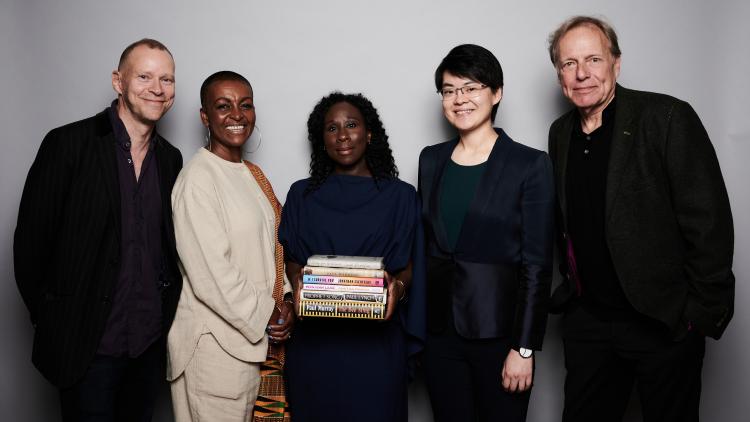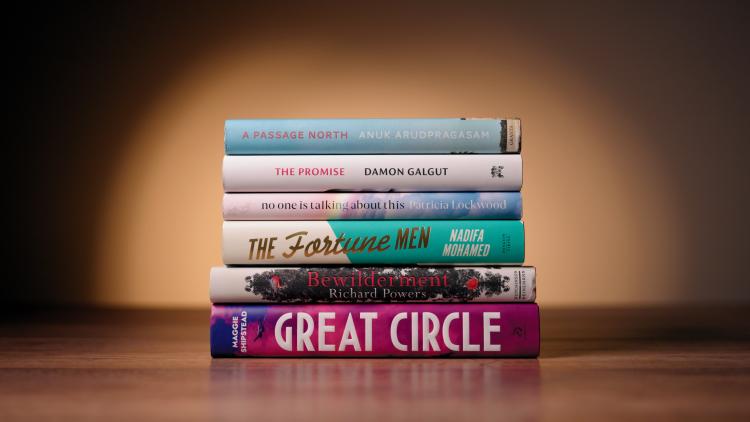

The Booker Prize guide to... dystopian fiction
Prophet Song by Paul Lynch has won the Booker Prize 2023, with a nightmarish vision of life in a totalitarian Ireland. But it’s far from the first dystopian novel to have been recognised by the Booker judges
See below for our full reading list of dystopian fiction titles from the Booker Library, available from Bookshop.org.
This article was first published in 2022. Illustration by Jamie Portch.
The concerns of dystopian fiction have a habit of coming back around. The repressive society in Orwell’s Nineteen Eighty-Four was looking a touch dated by the time its title year rolled in; under the shadow of the lumbering, top-heavy Soviet Union, the thought of any state maintaining a repressive system of 1984’s efficiency seemed a mere category error.
But the book’s cynicism bit deeper as the Eighties swept by and the age of the digital panopticon unveiled new tools for human control. Likewise, the misogynist US theocracy that Margaret Atwood created in The Handmaid’s Tale slipped quietly back into the can’t-happen-here category until the 2016 US elections, and grew another set of fangs in 2021 with the success of anti-abortion lobbyists in Texas – and then with the Supreme Court’s overruling of Roe v. Wade in 2022.
This strange orbital dance with relevance is as old as the dystopian genre, which is only partly a mode of satire. Its visions are both pointed deliberately towards their moment and angled curiously away from it, towards futures that rarely arrive on schedule.

Margaret Atwood
© Liam SharpModern readers of one of the earliest dystopias, Mary Shelley’s The Last Man (1826), a book written eight years after Frankenstein and swiftly forgotten, may feel a prickle at the nape to see its band of imagined 21st-century Brits watching a pandemic and several freak weather events sweep across Europe towards them accompanied by ‘the daily arrival of vessels from the east, crowded with immigrants’.
Of all the games one might play with the Booker Library, one of the most darkly tempting is to wonder which of its fancied nightmares may be bleakly rediscovered as truth by future readers.
Atwood, by some distance the Booker’s favourite dystopian writer, is a top candidate here. Her novel Oryx and Crake (2003) imagined a male-dominated near-future of violence, porn and violence-porn, followed by a technicolour biopocalypse that engineers humans out of existence; it is so effortlessly packed with terrifying ideas about our gene-spliced future that every passing month (viral lab leaks? monkey-human embryos?) brings an unsettling chime of near-recognition.
After the TV adaptation of The Handmaid’s Tale and its Booker-winning sequel The Testaments (2019), Atwood has a strong claim to being contemporary society’s dystopian-in-chief as well – and if reducing her work to prediction does a disservice to the gleefulness of her satire, the books can certainly survive it.

Mary Shelley portrait by Richard Rothwell, 1840
© Heritage Images/Getty ImagesIt’s also easy to feel the sleeve-tug of psychological prescience in Julian Barnes’s sombrely farcical England, England (1998), in which a tycoon creates a monstrous theme park on the Isle of Wight that presents the English experience honed and focus-grouped to its grimly commercialised essentials: Man U, Diana’s grave, Stonehenge, Robin Hood, the White Cliffs of Dover etc. In short order, this potted Blighty buys off the Royal family and declares independence, leaving the old, complicated, historic landmass north of the Solent to simply wither away. Dead on target with its satire on heritage capitalism, this is a book that seemed to scent the winds of Brexit nationalism two decades early.
Serious science fiction, observed Ursula Le Guin, is a mode of realism and not of fantasy. The line comes from a review of Last Letters from Hav (1985), Jan Morris’s glittering, Booker-shortlisted dispatch from an imaginary Mediterranean archipelago poised between Yeats’s Byzantium and the fictions of Borges, and it casts light on several of the more obliquely dystopian novels on Booker lists over the years.
What to make of Can Xue’s Love in the New Millennium (2019), for example, a novel whose characters are bedevilled not by abstract state surveillance but by a ludicrously physical succession of informers: an eavesdropper at the window, a spy in the herbaceous border, a man discovered creeping through the house who explains ‘I often sneak into her home and hide here. You might think it’s strange, but it’s something I need to do’? Is this surrealist satire, admonitory dystopia or a bald statement about certain aspects of life under Xi Jinping? Perhaps all three.
A similar uncertainty hangs about John Lanchester’s The Wall (2019), a novel about a future Britain that has erected a vast wall to protect it from rising sea levels — and, not accidentally, from immigrants, whom the nation’s young are conscripted to fend off. Written amid a storm of Brexiteering anti-immigrant rhetoric and Trumpian bombast about big beautiful walls, Lanchester’s melancholic novel is curiously uninterested in satirical point-scoring. Instead, there’s something bleakly realist about its downbeat style and its pragmatic concerns (military shift patterns, siegecraft, taking your partner to meet your mum) that lodges inextricably in the reader’s mind.

Julian Barnes
© Alan Edwards/AlamyKazuo Ishiguro’s Klara and the Sun (2021), a novel by a writer drawn throughout his career to systems in mid-collapse (the English aristocracy, Japan after the surrender, 1930s Shanghai, post-Roman Britain), employs a related approach. Here, tropes familiar from dystopian SF – a future society split between a country-dwelling elite and city-locked proles, gene-editing for children, robot companions more honourable than the people who create them – merge into the background of a story that is focused less on social than emotional understanding.
The set-up recalls Ishiguro’s stealthily horrifying Never Let Me Go (2005), set in an alternate-world Britain where clones fated for organ harvest exchanged cosy folktales about a more forgiving universe, but this later novel is far less sour and disturbing. Klara, the shrewd ‘Artificial Friend’ enlisted as companion to an ailing child, is a curiously timeless figure, with a quiet moral fervour that, like the position of ‘companion ’to the landed rich, might have come from the pages of a 19th-century novel. Amid so many grim imagined futures, it is a book with a quiet warm glow of its own.
Other novels, less overtly futuristic, take the approach of tweaking a single detail in an otherwise realistic setting and tracking the ramifying oddities that result. In Mohsin Hamid’s Exit West (2017), a civil war brings a nameless Middle Eastern country to its knees and casts its citizens adrift. But a set of black doors have popped up across the capital that collapse the world’s borders entirely, reducing a refugee’s journey from a soul-sapping intercontinental slog to the distance between two rooms.
Hamid’s novel passes through other dystopian tropes – cities ringed with communities of have-nots and policed by government drones, legions’ of nativist extremists – but it steps gleefully across their threshold towards a wider and more fascinating examination of how a world of unconstrained migration might actually function.
Similarly, Samanta Schweblin’s Little Eyes (longlisted for the 2020 International Booker Prize) takes one familiar idea – the eager abandonment of privacy in the connected environment, and the enthusiastic permissions offered by the internet to watching and being watched – and folds them inside out, imagining a world where internet-connected soft toys allow ‘dwellers’ to inhabit a small furry body in the house of a random ‘keeper’. There are moments of memorably dystopic misery, but Schweblin’s fractal exploration of her premise is ultimately against gloom: her book is rapturously fascinated by connection, curiously free of the sense of moral judgment so common in imagined futures.

Kiera Knightley and Carey Mulligan in Never Let Me Go, 2010
© Fox Searchlight/AA Film Archive/AlamyThe war against memory is, of course, a war against books as well, and it is dystopian writing’s recurring nightmare, the thread that connects a thousand Bad Timelines. In Howard Jacobson’s J (2014), the reader encounters a future Britain that has been mysteriously reorganised across its public and private spheres: everyone is unusually polite and incurious, all citizens have been compelled to take new names, and a set of uncomfortable events in the not-so-recent past are referred to by the shifty expression ‘what happened, if it happened’.
As Jacobson’s grimly patient narrative unfolds, it transpires that this story is set in a future Britain where a fresh Holocaust made it all the way to a final solution, and where the idea of Jews and Jewishness has been eliminated from the public record. This conceit, likely to have been a blunt weapon in other hands, is brought alive by Jacobson’s fascination with the subtexts, evasions and hidden implications of British social conduct. In a daring artistic move reminiscent of Orwell’s maddening Newspeak coinages, J enlists its readers ’complicity by forcing them into the cramped, thinned-out conceptual space in which its protagonists struggle to express themselves.
In this, the book is a strange cousin to another book about the erosion of memory, Yoko Ogawa’s The Memory Police (1994, shortlisted for the 2020 International Booker Prize). Set on an unnamed island under a nebulously totalitarian regime, it describes a world in which citizens are compelled by the ever-vigilant Memory Police to lose something every day – the use of ribbons, a particular smell – and purge not only the object from their lives but the memory from their minds as well.
There are echoes here with another Booker-selected dystopia focused on imperfect recall – Anna Smaill’s The Chimes (2015), in which a dreadful instrument called the Carillon rings out over London each night to retune the memories of its inhabitants - but despite its surveillance-state dystopian vibes, Ogawa’s supple, shifting prose is in pursuit of bigger game. This strange and symbolically elusive novel is finally less about the experience of a repressive social order than that of living in a world that vanishes around us – species by species, glacier by glacier – and about the human imperatives of forgetting, losing and dying.

Yoko Ogawa
© Ulf Andersen/GettyOther work seeks the germ of dystopia closer to home. James Kelman’s Translated Accounts (2001), written in a passionless newspeak and describing the various horrors and indignities of totalitarian rule in an unnamed country, is a book that feels more pertinent than ever in a world where machine translation puts us closer to the distant lives of others but ever further from the context of their speech.
With its looping, stunted sentences that seem to have been translated from garbled sources, by non-native speakers or by machines, it describes a dystopia of the emotions, an endless war in chilly fragments – ‘The mist clung to us, we were herded, the chill, children. Yes we had heard the stories.’ Published in 2001, in the immediate aftermath of the Yugoslav Wars, it is a book that has overleapt its context to speak to the future as well.
And then there’s Patricia Lockwood’s No One Is Talking About This (2021), a meme-crammed novel set somewhere in the dislocated online mind of the present day and told in a caffeinated tone of reflexive witticism-generation that has the authentic ring of nightmare.
Split not altogether elegantly down the middle, the first half sets up its narrator – a woman with a cat called Dr Butthole who acquires internet fame for a Twitter post asking ‘Can a dog be twins?’. Then, in the second half, Lockwood sets her narrator’s self-consuming irony on a collision course with the grim truths of sorrow and mortality. The ‘portal’ of this book – its term of art for the internet – is drawn from life but transmitted in the tone of science fiction.
You might argue that Lockwood’s is merely a realist novel for an already-dystopian age, but it reveals the tacit subtext behind even the wildest dystopias. If you think this place is shocking, it says, surprise; you live there already.

Patricia Lockwood, author of No One is talking About This
© David Parry/PA Wire
























































































